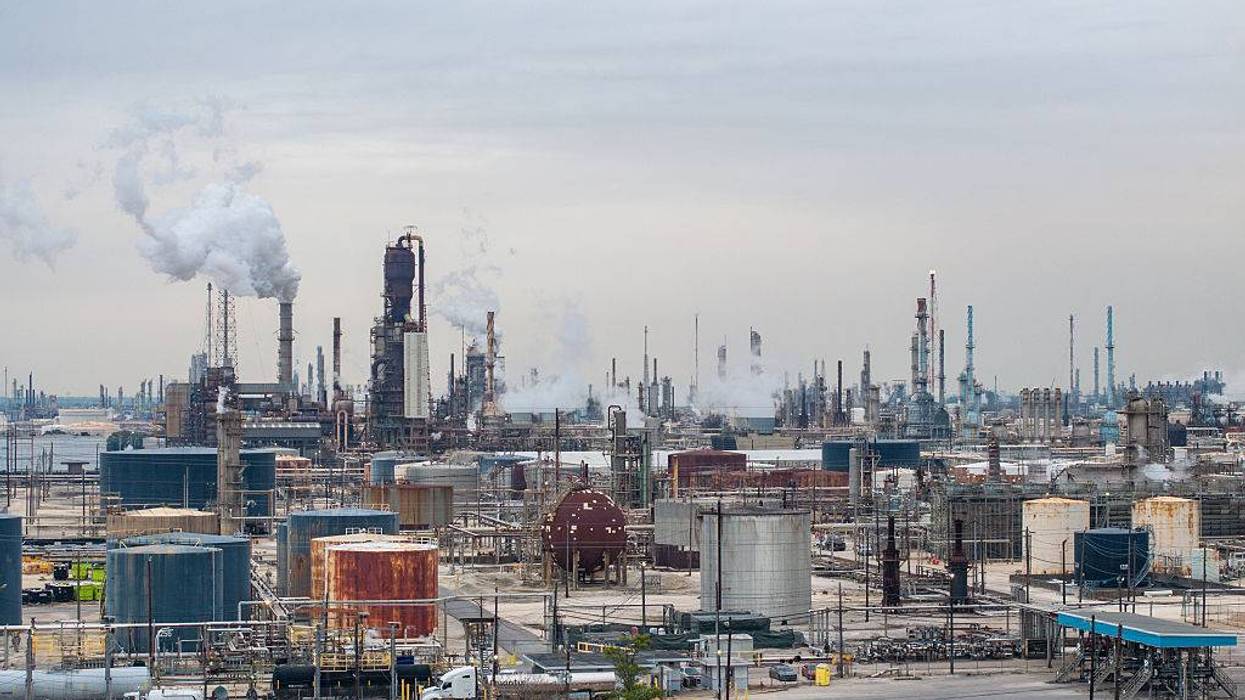A coalition of national and regional research, policy, and advocacy organizations filed a complaint with the Federal Trade Commission today arguing that Smithfield, the nation's largest pork producer, routinely makes false and misleading claims about the sustainability of its pork products and the company's environmental record.
Instead of investing in sustainable production practices, the complaint demonstrates that Smithfield continues to destroy the environment while greenwashing its products by proposing massive anaerobic digesters to produce factory farm biogas, all in the pursuit of greater corporate profit.
While Smithfield relies on marketing terms like "sustainable" and "highest environmental standards," its products actually come from extremely unsustainable, industrialized production and processing facilities with long and ongoing records of environmental degradation.
"Smithfield's false and misleading marketing attempts to cover up its environmentally devastating factory farm model," said Food & Water Watch staff attorney Tyler Lobdell. "Instead of actually cleaning up its act, Smithfield is investing in slick tag lines and false solutions like factory farm anaerobic digesters to dupe consumers. This is classic corporate greenwashing, and the FTC must take action to protect the public and truly sustainable producers from this illegal conduct."
"Smithfield's false and misleading marketing claims deceive consumers and steal market opportunities from truly sustainable farmers and ranchers," said Joe Maxwell, President of Family Farm Action Alliance. "Smithfield claims they are nearing an environmental goal of 100% compliance 100% of the time. But, from polluting our drinking water, to spewing toxins into minority communities, and lying to customers, it seems the only thing they are 100% committed to is deceit."
The filing, led by Food & Water Watch, documents a litany of dubious claims made by Smithfield about the company's environmental stewardship -- claims that are thoroughly undermined by Smithfield's lengthy record of environmental violations and disregard for the health of communities living near its facilities. In reality, Smithfield is one of the biggest industrial polluters in the United States.
Smithfield claims it has an "industry-leading sustainability program" and is close to achieving an environmental goal of "100% compliance, 100% of the time." The company tells consumers that its facilities are "the opposite" of factory farms, and its sustainability website, as described in the complaint, "depict[s] sunny and bucolic farms that bear little resemblance to the actual facilities where the animals used in Smithfield's products are raised."
Indeed, the lengthy record of air and water pollution linked to Smithfield's operations makes a mockery of the company's "Good food. Responsibly.(r)" slogan. Smithfield is the third-largest water polluter in the country, and in 2019 the company was issued at least 66 notices of violations of already bare minimum environmental protection laws. Its Tar Heel, North Carolina plant has a long record of Clean Water Act violations, as well as serious air pollution violations. Smithfield's operations in the state have been linked to massive fish kills, and as recently as January of this year North Carolina officials called out the company over massive spills of hog waste into waterways and the local environment.
The massive amount of pig manure created by the company -- estimated at over 19 million tons per year-- creates substantial threats to water quality and public health. Those threats are only exacerbated by Smithfield's irresponsible practices, which include spraying pollution-laden waste on fields throughout the country.
A series of lawsuits in North Carolina documented an array of nuisances linked to Smithfield's waste lagoons and manure spraying. The company has been hit with millions of dollars in damages. As the Fourth Circuit Court of Appeals recognized, Smithfield's production practices are characterized by "interlocking dysfunctions" that the company "willful[ly]" and "wanton[ly]" ignored to maximize profit.
"Smithfield isn't a good neighbor - just ask the hundreds of people who filed nuisance lawsuits against the company, and the jurors in each of those lawsuits who found Smithfield guilty. Every time," said Kemp Burdette, the Riverkeeper with Cape Fear River Watch. "They aren't a 'green' company. They spray untold millions of gallons of untreated hog feces and urine onto the landscape of eastern North Carolina every year. They have not taken a single step in fulfilling the promises they made twenty years ago to put some of their billions of dollars of profits into improving waste management, and spills and violations are a regular occurrence on factory hog farms in the Cape Fear Basin."
By its own account, Smithfield's water usage and wastewater discharges are rising. In 2019, the company consumed over 11.14 billion gallons of water at just a fraction of the facilities involved in producing its products, which is more water than all the domestic fresh water users combined in approximately 20 U.S. states and territories.
The FTC complaint also zeroes in on an increasingly common corporate greenwashing tactic: Promoting the use of anaerobic digesters as a 'clean energy' innovation. As the filing lays out, installing digesters to produce factory farm biogas cannot be considered a sustainability initiative and is not "clean" energy.
These digesters serve to entrench some of the most dangerous factory farm practices -- in effect monetizing Smithfield's waste mismanagement rather than addressing the root causes of its greenhouse gas emissions and other pollution. The waste products left over after the digestion process can be even more environmentally hazardous, and the eventual burning of factory farm biogas still releases harmful pollutants like carbon dioxide, nitrogen oxides, ammonia, and hydrogen sulfide.
The coalition's complaint asks the FTC to investigate and take enforcement action against Smithfield by requiring it to remove these misleading claims, and to enjoin the company from making similar misrepresentations in the future.
Joining Food & Water Watch in filing the complaint are Cape Fear River Watch, Dakota Rural Action, Family Farm Action Alliance, Institute for Agriculture and Trade Policy, Iowa Citizens for Community Improvement, Missouri Rural Crisis Center, Pennsylvania Farmers Union, and Socially Responsible Agriculture Project.





